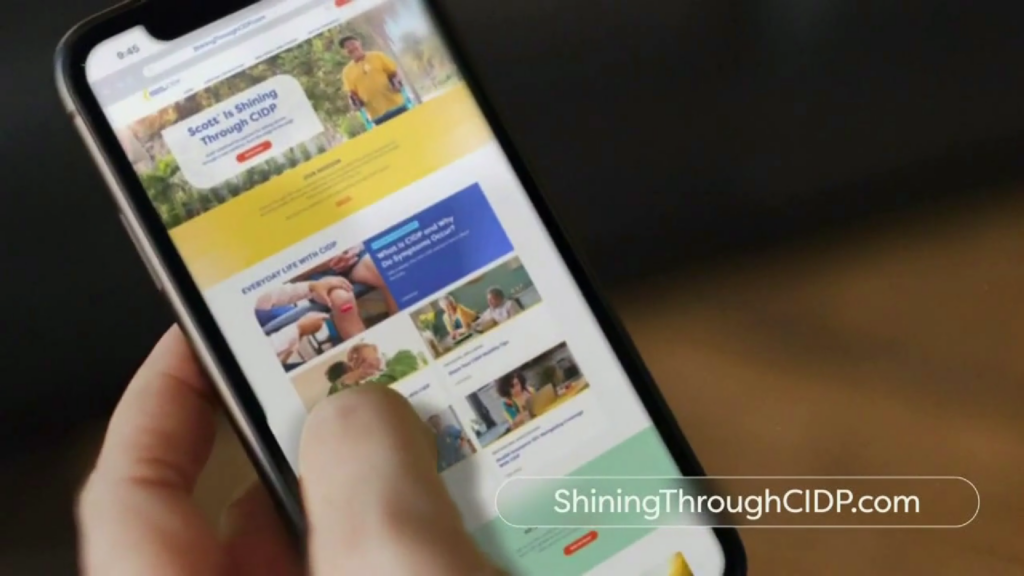argenx, a leading global immunology company committed to enhancing the well-being of individuals with severe autoimmune conditions, has launched a new TV commercial titled “CIDP Sucks” to promote advocacy and awareness for chronic inflammatory demyelinating polyradiculoneuropathy (CIDP).
The advertisement features patients with CIDP, highlighting how ordinary tasks become substantial challenges due to the persistent symptoms that overshadow their daily lives. Through powerful storytelling, these individuals share their journeys of overcoming CIDP’s obstacles, showing resilience in the face of adversity and hope as innovative treatments emerge.
The new CIDP commercial opens with CIDP patients, accompanied by a voiceover that emphasizes the challenges faced by those living with the condition. It concludes with scenes of patients walking, dancing joyfully and participating in daily activities, underscored by the support provided through ShiningThroughCIDP.com, a website by argenx. This platform is designed to guide CIDP patients toward support systems, empowering them to reclaim their lives.
CIDP is a rare autoimmune disorder where the body’s immune system mistakenly attacks its own tissues. Specifically, CIDP targets myelin sheaths, which are fatty coverings that protect and insulate nerve fibers. The exact cause of this immune response is unknown, and there appears to be no identifiable genetic predisposition to CIDP.
Researchers estimate that the incidence of CIDP in the US ranges from 0.8 to 8.9 new cases per 100,000 people annually.
As part of their ongoing commitment to improving CIDP patient outcomes, argenx’s efgartigimod alfa could soon be a new treatment option.
XTALKS WEBINAR: From Insight to Impact: Leveraging Early Medical Affairs Engagement for Future Commercial Success
Live and On-Demand: Wednesday, July 10, 2024, at 11am EDT (4pm BST/UK)
Register for this free webinar to learn how small and mid-sized companies can effectively prioritize and leverage medical affairs strategies to enhance asset valuation and navigate competition.
Potential New CIDP Treatment: argenx’s Efgartigimod Alfa
The US Food and Drug Administration (FDA) has accepted argenx’s supplemental Biologics License Application (sBLA) for Vyvgart Hytrulo (efgartigimod alfa and hyaluronidase-qvfc) for priority review to treat CIDP. The FDA’s decision under the Prescription Drug User Fee Act (PDUFA) is anticipated by June 21, 2024.
Vyvgart Hytrulo is a subcutaneous formulation that combines efgartigimod alfa, a human IgG1 antibody fragment, and recombinant human hyaluronidase PH20. This innovative formulation uses Halozyme’s Enhanze drug delivery technology, facilitating the subcutaneous administration of biologics.
The sBLA is supported by data from the Phase II ADHERE study, which is the largest clinical trial ever conducted for CIDP. ADHERE involved adults who were either treatment-naive (not on active treatment within the past six months) or currently receiving immunoglobulin therapy or corticosteroids. The trial began with a run-in period during which existing treatments were discontinued, followed by an open-label Stage A. Responders to Vyvgart Hytrulo in Stage A then progressed to a randomized, placebo-controlled Stage B.
In Stage A, 322 patients received VYVGART Hytrulo. Of these, 67 percent showed evidence of clinical improvement (ECI) after the run-in period. Excluding ongoing patients, 70 percent demonstrated ECI, and in a sensitivity analysis, 78 percent showed ECI after receiving at least four injections. Response rates were consistent across all prior CIDP medication subgroups.
In Stage B, 221 responders from Stage A participated. Vyvgart Hytrulo significantly reduced the risk of CIDP relapse compared to placebo, achieving the primary endpoint with a 61 percent reduction in relapse risk. At Week 24, relapse rates were 26 percent for Vyvgart Hytrulo versus 54 percent for placebo, and at Week 48, 34 percent versus 60 percent. Vyvgart Hytrulo patients experienced longer time to relapse, with Kaplan-Meier curves separating at Week 4 and continuing through Week 48.
Patients in Stage A showed a mean improvement of 7.7 points on the Inflammatory Rasch-built Overall Disability Scale (I-RODS) and 12.3 kPa in grip strength, benefits maintained in Stage B for treated patients but lost in placebo patients.
Additionally, the study underscored the favorable tolerability profile of Vyvgart Hytrulo. The most common treatment-related adverse event was injection site reactions (ISRs), which occurred in a low percentage of patients.
New CIDP Treatments on the Market
In January 2024, the FDA approved Takeda’s Gammagard Liquid for the treatment of CIDP in adults. This approval made Gammagard Liquid the only intravenous immunoglobulin (IVIg) in the US with multiple neuromuscular disorder indications. It is the exclusive FDA-approved IVIg for maintaining therapy to enhance muscle strength and reduce disability in adults with multifocal motor neuropathy.
The FDA’s decision was based on positive Phase III trial results from a multicenter study assessing the efficacy and safety of Gammagard Liquid in adult CIDP patients. Remarkably, all participants showed improvements in functional ability, measured by a composite outcome metric comprising the Inflammatory Neuropathy Cause and Treatment (INCAT) score, grip strength or Rasch-built Overall Disability Scale (R-ODS) score, with a responder rate of 94.4 percent.
In early 2021, the FDA approved Pfizer’s Panzyga for the treatment of CIDP. Panzyga is the first FDA-approved IVIg offering two maintenance dosing options for CIDP.
Panzyga’s approval for CIDP was based on data from a prospective, double-blind, randomized, multi-center Phase III study involving 142 patients with CIDP. This Phase III study was unique as it was the first IVIg CIDP treatment study to evaluate multiple maintenance dosing options.
Panzyga’s Phase III trial results for CIDP showed that nearly 80 percent of patients in the 1 g/kg treatment group responded positively. The study showed dose-dependent efficacy, with multiple supportive endpoints revealing favorable outcomes. In the 2.0 g/kg dose group, 92 percent of patients showed improvement in the adjusted INCAT score. Additionally, dose-dependent improvements were observed in grip strength, the I-RODS and Medical Research Council (MRC) sum scores across both the 1.0 g/kg and 2.0 g/kg dose groups.
To have your company featured on Xtalks, please email Vera Kovacevic, PhD, at: [email protected]












Join or login to leave a comment
JOIN LOGIN